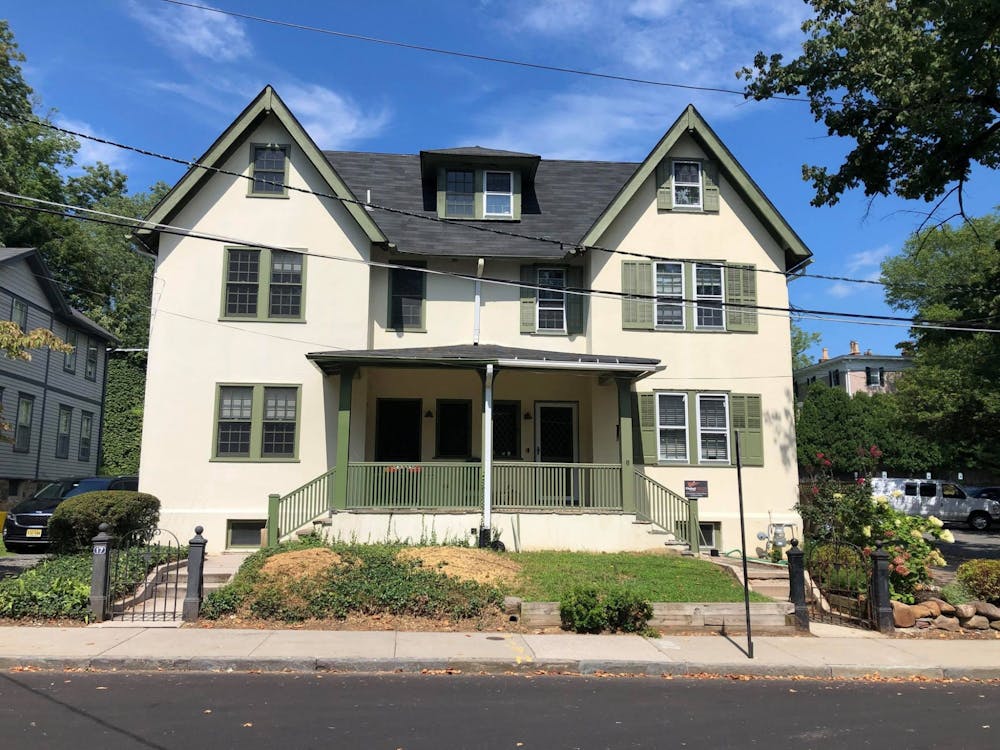On a typical Friday night in the dead of New Jersey winter, strolling through a narrow street off University Place and just short of Nassau, one might find an unusual scene: as many as 100 students celebrating Shabbat, the weekly Jewish day of rest, by dining outdoors in a tent adjacent to a small house. Shabbat is marked traditionally by refraining from work and partaking in communal meals.
Now, a University sale of the house next door will allow the University’s Chabad House to finally “bring students in out of the cold,” in the words of director Rabbi Eitan Webb — whenever students eventually return to campus, of course.
As the Scharf Family Chabad House expanded its reach to Jewish students on campus over the past decade, the religious organization’s home-base at 15 Edwards Place — which doubles as the home of Rabbi Webb, his wife Gitty, and their six children — no longer sufficed.
“Together with a group of alumni and led by Michael Scharf ’64, we purchased our first property,” Webb recalled in an email to The Daily Princetonian, referring to 15 Edwards Place. “At the time we were ecstatic and thought that surely we had enough space now. How wrong we were.”
“The big house has become too small,” Webb added, explaining that in recent years he has been forced to host Shabbat dinners outside of his home in a rented tent — “even in the dead of winter.”
Soon, those freezing dinners — slightly alleviated by outdoor heaters — will be no more. University Deputy Spokesperson Michael Hotchkiss confirmed the early August sale of the University’s property at 17 Edwards Place — the second half of the same duplex — to Chabad, which, according to Webb, will enable Chabad to “merge the two sides,” creating a property that totals some 5,000 square feet.
“We are pleased that we could work together with Chabad to find a mutually beneficial solution to its need for additional space,” Hotchkiss wrote to the ‘Prince.’ Hotchkiss declined to comment on the exact amount for which the University sold the property but wrote that “the exchange of properties was based on market value.”
Webb expressed his personal gratitude to the University for agreeing to the sale and noted that “we had been speaking to the University for a long time about this.”
“To us, this is a statement of trust in the meaningfulness of Chabad and of the importance [of] religious life as a whole,” he wrote.
Dean of Religious Life Rev. Alison L. Boden told the ‘Prince’ that the Office of Religious Life had been consulted about the value of the house’s purchase to students. “I was happy to lend our office’s support to the initiative,” she explained.
“Our hope is always that every religious community can thrive as much as possible,” she continued. “Chabad has needed significantly more space to accommodate those who are interested in participating in their programs. Hopefully the new facility will ease their crowding issues and have a wonderful impact on the experience of Jewish students.”
It’s a “big project,” Webb admitted, and to that end, construction will begin “as soon as we are able to secure the necessary permissions.”

For Arielle Mindel ’21, Chabad’s student president, the goal of the additional property is to ensure that Chabad and students who participate are “not restricted.”
Beyond the importance of having the option to “just go inside” for dinner, Mindel stressed that the expanded house will create opportunities for students “to just come and do their homework, or drink a cup of coffee.” Jeremy Chizewer ’22, treasurer of Chabad’s student board, felt similarly, telling the ‘Prince’ he is “looking forward to the extra spaces for students to learn and spend time together.”
In Webb’s view, the benefit of the purchase comes down to allowing students to be more comfortable — having one outdoor tent and one indoor gathering space imposed limitations.
“There is a class in one half of the room and a small conversation in the other side,” he described. “As soon as the class ends there might be a student board meeting, which will be interrupted by an event, which will still be ongoing as another class begins in a corner of the room.”
“It’s all wonderful and there is a certain energy that comes with all of that,” he added. “But a larger space will allow that to spread over multiple rooms.”
But Mindel does not want to see Chabad lose that “certain energy” Webb referenced in the new house. To her, one of the most important aspects of Chabad is its “homey environment.”
“One of my goals with the addition is to make sure that that homey feeling is still able to happen in the larger space,” she explained. “I don’t want it to turn into ‘this is the official Chabad space’ ... I still want it to feel like a house, not a building.”
What Mindel called a homey environment, Webb referred to as Chabad’s quintessential “family feeling.” Even in the new virtual reality, with very few students physically on campus, Eitan and Gitty Webb, the organization’s co-directors, have been thinking creatively about how to preserve an atmosphere of community.
“Gitty and I have made it our project to try and provide mentors as well as source internships and jobs for as many students and young alums as we can,” Webb explained. “We are proud to say that we have not had a single alum turn down a request to speak with a student. That is the definition of community and that is what we hope to double down on.”








